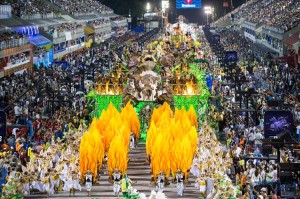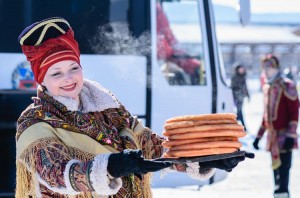¡Carnaval!
February 24, 2017
In many places, today marks the beginning of the annual festival known as Carnival—or Carnaval in Spanish and Portuguese. Carnival is a lively time of dancing, feasting, music, pageants, and parades prior to the beginning of Lent, a strict religious season observed in the spring by most Christians. People celebrate Carnival around the world. The largest and most famous Carnaval draws millions of people each year to Rio de Janeiro, Brazil. In the United States, the best-known Carnival is held in New Orleans, Louisiana—an event capped by the city’s famous celebration of Mardi Gras (French for Fat Tuesday).

Colorful and boisterous parades highlight the festivities during the world famous Carnaval in Rio de Janeiro, Brazil. Credit: © CP DC Press/Shutterstock
In some places, the Carnival season begins as early as January 6, a Christian holiday known as Twelfth Night marking the end of the Christmas season. The main events of Carnival, however, are packed into the Shrovetide—the final days before Lent. Lent is a time of spiritual discipline, fasting, prayer, and self-sacrifice running from Ash Wednesday to Easter—a period of about 40 days. To prepare for this lengthy period of physical denial, people have traditionally loaded up on things they abstain from during Lent such as eating meats or sweets or drinking alcohol. The word carnival comes from the old Italian word carnelevare, meaning a leaving off of (eating) meat.

Traditional pancakes are served at several different Shrovetide celebrations around the world. Here, a Russian woman offers fluffy crêpes during Maslenitsa, a week-long festival leading up to Ash Wednesday. Credit: © Shutterstock
Carnival festivals are most common in Roman Catholic areas of Europe and in the Caribbean Islands and other parts of Latin America. Shrovetide celebrations come in many different sizes and shapes. In parts of Scandinavia, delicious sweet rolls called semla or fastelavnsboller are eaten on Fastelavn (Fasting Evening), the day before Lent. In parts of Germany and Switzerland, the day is called Fastnacht or Fasnacht (Fasting Night). In the United Kingdom, Pancake Day or Pancake Tuesday precedes Ash Wednesday. In many Russian and Ukrainian communities, the pre-Lenten Maslenitsa festival is a time for butter, cheese, and crêpes (thin pancakes).


